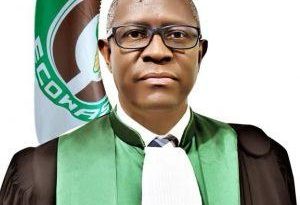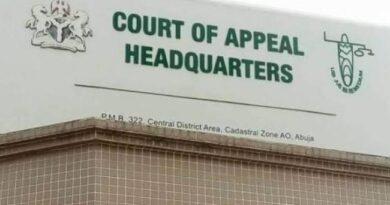CCT Chairmanship: Amid Pressure, Danladi Umar Withdraws Suit Against Tinubu, NASS
Justice Danladi Yakubu Umar, the embattled Chairman of the Code of Conduct Tribunal (CCT), has quietly withdrawn his lawsuit challenging the controversial appointment of Dr. Mainasara Umar Kogo as his successor—an appointment made by President Bola Ahmed Tinubu in alleged violation of constitutional procedures.
PRNigeria reports that in Suit No: FHC/ABJ/CS/1796/2024, filed at the Federal High Court, Abuja, Justice Umar—alongside civil society groups—had sought to nullify the appointment of Dr. Kogo.
The respondents listed in the suit included President Tinubu, Attorney-General of the Federation Lateef Fagbemi (SAN), Senate President Godswill Akpabio, the National Assembly, the National Judicial Council (NJC), and the Federal Judicial Service Commission (FJSC), among others.
However, in a surprising development, a “Notice of Discontinuance” dated March 20, 2025, and signed by Umar’s legal representatives—M.M. Maidoki, A.G. Salisu, and Jibrin S. Jibrin—was filed in court, effectively ending the legal challenge.
Sources told PRNigeria that Justice Umar decided to withdraw the suit following intense pressure from family members and respected elders from Toro, Bauchi State—his hometown—who urged him to prioritize family honor and avoid escalating political tensions.
A member of Umar’s legal team disclosed that, despite their firm belief that the President, National Assembly, and Secretary to the Government of the Federation (SGF), Senator George Akume, had acted illegally against Umar, they advised him to withdraw the case for the sake of his safety and the integrity of his family.
The removal attempts against Justice Umar ignited serious legal and constitutional controversy involving the Presidency, the National Assembly, and the SGF.
President Tinubu’s decision to appoint Dr. Kogo was first announced in July 2024 by presidential spokesman Ajuri Ngelale—despite the fact that Justice Umar’s tenure had not expired.
Compounding the controversy, the official appointment letter, signed by SGF George Akume, was dated January 20, 2025, but backdated to November 27, 2024—an action that raised further suspicion among legal scholars and political observers.
The National Assembly also contributed to the confusion by initially citing an incorrect constitutional provision and even misstating the name of the intended appointee—errors they later retracted—raising concerns that Umar’s removal was politically motivated rather than based on proven misconduct.
The move was widely condemned by legal experts, who described it as unconstitutional.
Senior Advocates of Nigeria (SANs) including Prof. Mamman Lawan Yusufari, Dr. Wahab Shittu, and Prof. Yemi Akinseye George pointed out that, under the Fifth Schedule of the 1999 Constitution, it is the National Judicial Council (NJC) and the Federal Judicial Service Commission (FJSC) that are empowered to nominate and recommend candidates for appointment to the CCT—not the President acting unilaterally.
There is no public evidence that the NJC, chaired by Chief Justice of Nigeria Justice Kudirat Kekere-Ekun, recommended any successor.
Similarly, there is no proof that the National Assembly met the two-thirds majority threshold required to lawfully remove Justice Umar.
The National Assembly’s move to oust Umar was reportedly initiated at the behest of the Presidency, leading to the litigation that has now been withdrawn.
Notably, President Tinubu, Attorney-General Fagbemi, and other officials had already filed their statements of defense prior to the discontinuance.
Justice Umar has previously presided over several politically sensitive cases, including the 2012 trial of then-Lagos State Governor Bola Tinubu over alleged false asset declarations. Although he discharged Tinubu, he did not acquit him—an outcome some believe might have posed constitutional hurdles during Tinubu’s political ascendancy.
With the withdrawal of the case, it remains uncertain whether Justice Umar will formally vacate his position or seek other avenues to contest Dr. Kogo’s appointment.
The Code of Conduct Tribunal (CCT) is a specialized court tasked with upholding ethical standards among Nigerian public officers.
It is empowered to try politicians, civil servants, judges, and others accused of breaching the Code of Conduct, including false asset declarations, foreign account ownership, conflicts of interest, and corruption-related misconduct. Upon conviction, the Tribunal can impose penalties such as removal from office, disqualification from holding public office for up to ten years, and forfeiture of assets improperly acquired.
By PRNigeria




